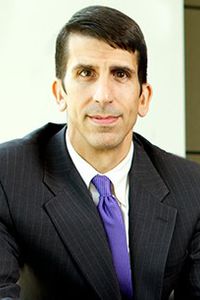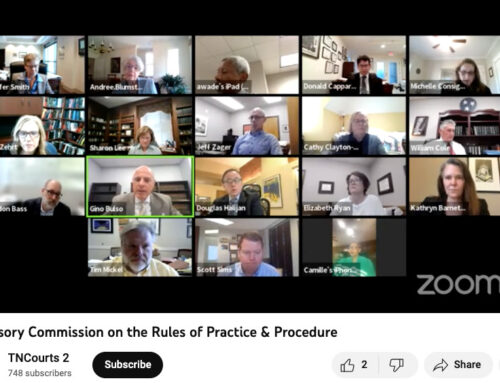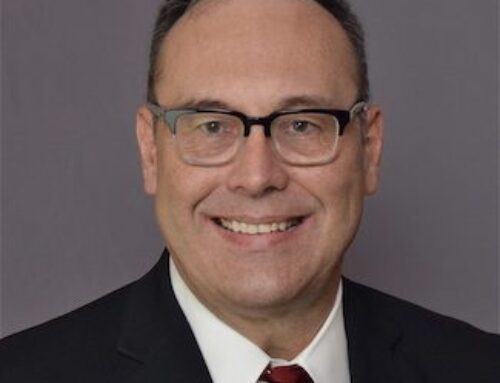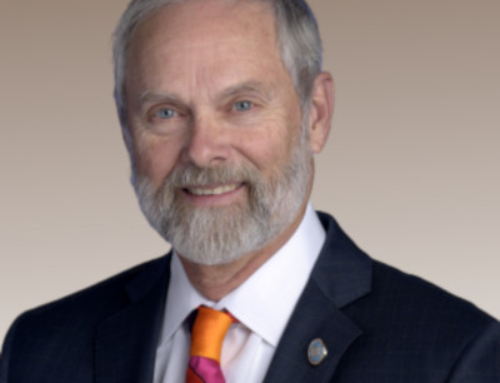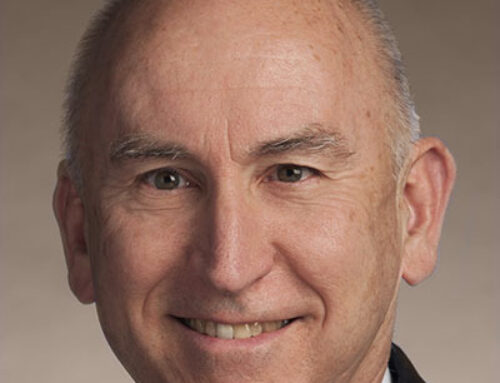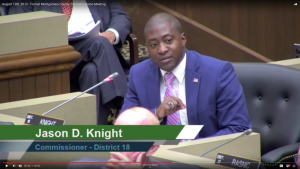
Montgomery County Commission Jason Knight claims that the county is violating his First Amendment free speech rights by banning him from livestreaming meetings to his Facebook page.
A federal district judge is scheduled to hold a bench trial in Nashville late this summer to determine whether a ban on livestreaming meetings of the Montgomery County Commission violates the First Amendment.
His decision could turn on whether the ban is narrowly tailored enough to address the government’s interest in security of commission chambers without burdening the speech rights of those livestreaming and commenting on the livestream.
Is Facebook livestreaming expressive conduct that qualifies as speech?
A year ago, U.S. District Judge Eli Richardson found it plausible that livestreaming the county commission meeting on a Facebook page, with its attendant interactive commenting features that engaged others in conversation, was expressive conduct.
The case began in 2019 after the county commission passed a resolution barring any “live broadcast from within the Commission Chambers of its proceedings.”
One of the county commissioners, Jason Knight, had livestreamed the commission meetings on his Facebook page where he actively participates, comments, and engages with the audience of his streams.
After the commission adopted the ban, Knight filed a federal lawsuit on Aug. 15, 2019, along with Joshua Wikholm, who Knight employed to stream the meetings, and David Webb, a citizen who frequently views and comments on livestreamed government events.
Ban prevents real-time political commentary, plaintiffs say
They allege in court filings that the ban on livestreaming not only prevents them from streaming the meeting to their social networks, but also prevents them from engaging in “political commentary with their own social networks about the contents of those meetings in real time, using the unique communicative features and tools available on platforms including Facebook and YouTube.”
The U.S. Supreme Court “has stressed the importance of social media as the modern public square,” they say in the court filings. And they argue that livestreaming is distinct from simply video recording because of its “communicative nature on social media.”
County: Livestreaming poses security threat to commission meetings
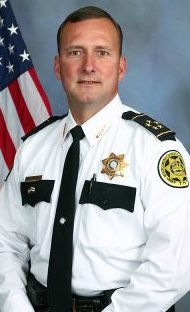
Montgomery County Sheriff John Fuson says that livestreaming a county commission meeting transmits real-time information to potential attackers.
The county argues that livestreaming a county commission meeting poses a security threat because it transmits “real-time” information that someone could use for an attack during the meeting. And while no specifics were given, they pointed to the Jan. 6, 2021, storming of the U.S. Capitol as an example of an attack on a legislative body.
“A live broadcast allows someone to show, in real time, the positioning of all officers, when and where their attention may be drawn away from one particular general security observation point to another based upon circumstances or a diversion, and can likewise transmit the presence of persons entering or exiting the Chamber during the meeting,” the county said in a court brief.
“…Anyone who wished to commit any sort of assault on the dignity of the meeting, the participants, or the general public would be aided by a live broadcast from the meeting…”
The county also quoted Montgomery County Sheriff John Fuson from his deposition, saying that “…Sheriff Fuson acknowledged, ‘anytime someone has a way to communicate information to folks outside of that inner circle [those inside the chamber] . . . that could give them an opportunity to . . . study . . . the movements of folks inside the building, could tell you who’s inside the building, where exactly they’re at in proximity to doors or windows or things like that that, you know, could cause folks to form some type of attack.’”
According to Fuson’s deposition, the public is only allowed in the building through the main entrance on the first floor where they have to go through a security checkpoint and be scanned for items such as knives or firearms. Other doors are locked and a person going to a commission meeting on the third floor would also pass by other sheriff’s deputies, including at least two stationed inside the commission chambers.
Fuson acknowledged that the county does not ban people from sending photos or texts from inside commission chambers to someone on the outside, but said that livestreaming — giving real-time video information — was his bigger security concern.
County offers ‘simultaneous broadcast’ on YouTube channel, but controls comments
The county in its defense said that the public who is not physically at the meeting can still follow along because it makes available on YouTube a “simultaneous broadcast” of the county commission meeting which it says is on a slight time-delay.
But the plaintiffs don’t buy that prohibiting livestreaming is the best security measure and argue it doesn’t “meaningfully improve” security. “Montgomery County could not identify a specific, articulable security threat posed by non-government livestreaming that did not depend on another, far more significant variable such as an unlocked or unattended door,” they countered in their brief.
And while the county’s YouTube channel also allows commenting, the county can block users and limit which public comments appear — features that the plaintiffs say discourage anyone from commenting. They said the county’s YouTube channel gets only a fraction of the number of participants that Knight gets on his Facebook livestream — 300 to 500 compared with 2,000 to 5,000.
For its part, Montgomery County officials have said that their approach doesn’t overly limit members of the public or journalists because it still allows them to use “audio and video recording devices” from a designated area in the commission chambers and share those recordings later on their social networks. They say the designated area is selected to limit video recording of certain aspects of the room that the sheriff thinks would harm security interests if shown.
However, even then, some confusion arose about taking photographs from a place in the commission chambers if not in the designated area. Fuson admitted the rule only restricts to the designated area people who are video recording, but said “[w]e have been sending folks to that corner to take photographs.”
The bench trial is set for Sept. 7.

